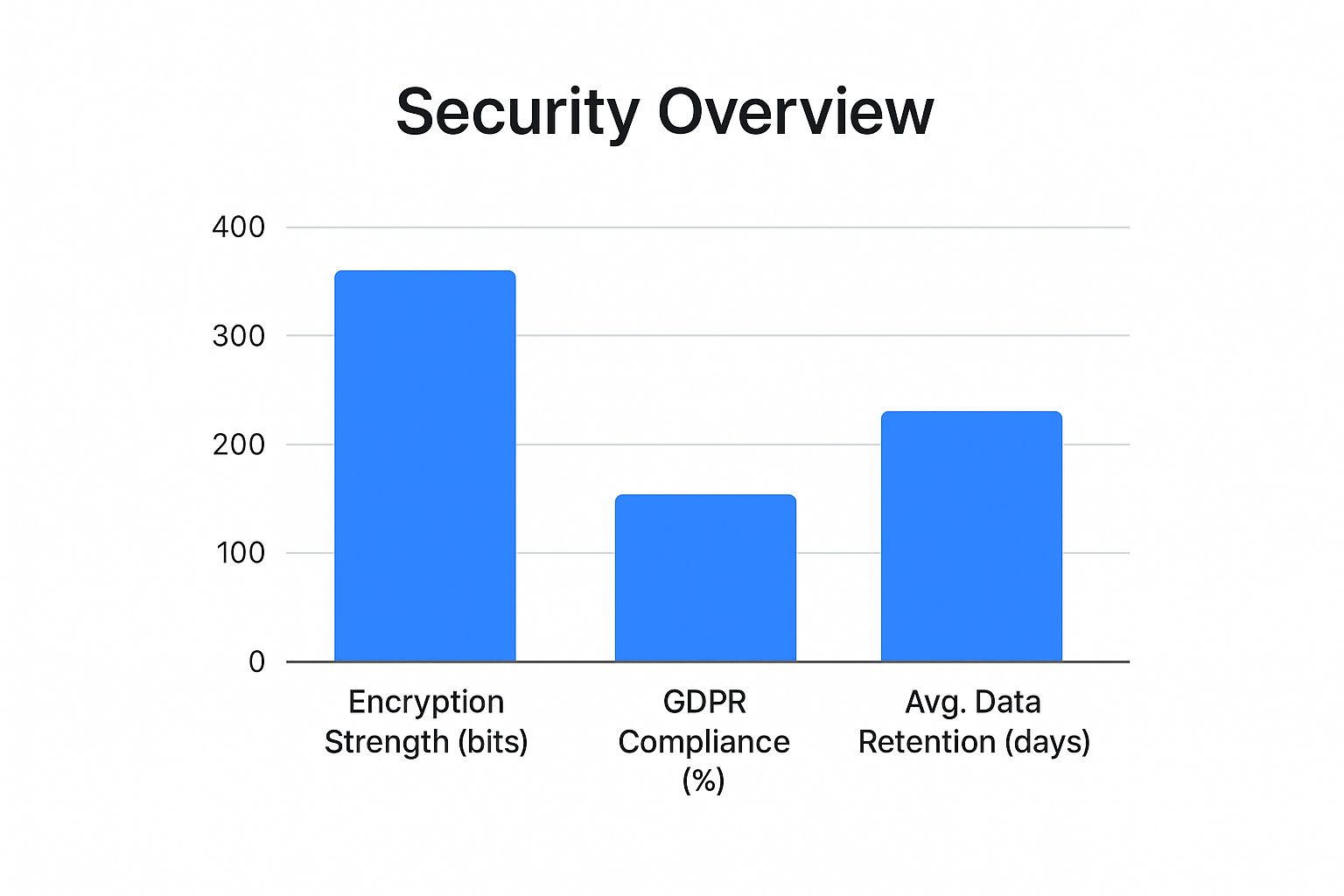Is AI Humanize Legit? A Full Review and Analysis

So, is AI Humanize a real tool? The short answer is yes, it's a genuine tool made to rewrite text from an AI to sound more natural, but your experience with it might differ. It’s basically a special paraphrasing tool, built to help you get past AI checkers and give your writing a more human feel.
What Is AI Humanize and How Does It Really Work?
Ever used an AI tool to write some text, only to read it back and think it sounds a bit… off? That’s the exact problem AI Humanize tries to fix. At its core, the tool takes that robotic-sounding, AI-written content and adjusts it to seem more natural and less like a machine wrote it.
Think of it as a digital editor that’s been taught to spot the classic giveaways of AI writing. Its main job is to polish that content by mixing up sentence structures, swapping out common AI word choices for better ones, and changing the overall flow to feel more authentic. This process is a big help for anyone trying to make their content actually connect with a human audience. For a deeper look into the tech, you can explore the basics of an AI humanizer and see what makes them work.
To give you a quick overview, here’s a summary of the key points we'll look into to figure out if AI Humanize is the real deal.
AI Humanize Legitimacy at a Glance
| Evaluation Factor | Summary Finding |
|---|---|
| Technology | Specialized paraphrasing to alter AI text patterns. |
| User Reviews | Generally positive, but effectiveness can be inconsistent. |
| Security & Privacy | Standard security measures, but users should be careful. |
| Pricing | Offers different plans, but the value depends on usage needs. |
| Alternatives | Many competitors exist, some with better functions or pricing. |
In the end, these factors help paint a clearer picture of where the tool stands in the market.
The Goal Behind the Technology
The big idea behind AI Humanize is to close the gap between machine speed and human expression. As AI becomes a standard part of creating content, tools like this are part of a much larger movement. This shift lines up with the broader trends of AI integration in the publishing industry, where the focus is on using technology without losing that essential human touch.
The need for these tools isn't just a guess; the data backs it up. Making AI content sound more human has a massive impact on how well it performs.
In fact, human-like AI content gets 45.41% more impressions and a huge 60% more clicks than standard AI output. This boost directly leads to better performance in search results, showing that a natural tone isn't just a nice-to-have—it’s more effective.
The Technology Used in AI Humanization Tools
To really figure out if an AI humanizer is the real deal, it helps to peek under the hood and see what makes it work. At their core, these tools are built on advanced language models. Think of these models as incredibly complex systems that have been taught using a massive library of text from across the internet.
This teaching process is what helps them recognize the patterns, context, and subtle quirks that make human writing, well, human.
When you put AI-made text into a humanizer, its first job is to examine the structure. It’s on the lookout for the classic AI giveaways, like:
- Repetitive sentence starters
- Overly formal or clunky vocabulary
- A predictable, almost metronome-like rhythm
From there, the system cleverly rephrases the content, swapping out those robotic phrases for more conversational and natural-sounding alternatives. It's not just a simple word swap; it's a deep rewrite that aims to vary sentence length and complexity. The end goal is to make the text far more interesting for a human reader.
Core Rewriting Mechanisms
The real magic happens when the tool starts adjusting the text's tone and style. A dependable humanizer can take a bland, generic paragraph and give it a specific personality—whether you need it to sound casual, professional, or academic. This ability to change on the fly is a key sign of a quality tool. For example, a leading choice like Word Spinner excels at this, using advanced rewriting to make content sound natural and guaranteeing it's 100% plagiarism-free.
This space is getting a lot of attention for a reason. In fact, the market for human-centered AI, which includes these humanization tools, was valued at USD 9.5 billion in 2023 and is expected to hit USD 68.8 billion by 2033. That’s a huge jump, and it shows just how much demand there is for making AI outputs feel more authentic.
To really get a handle on what AI humanizers can do, it helps to understand the big-name AI models that give them power. For a deeper look into the foundational tech, check out a mini guide to ChatGPT, Gemini, Perplexity, and Claude.
By focusing on these core principles, humanization tools can successfully smooth over the tell-tale signs of AI writing. This makes the text less likely to get flagged by AI checkers and, more importantly, a whole lot better to read.
What Real Users Are Saying in Reviews
To get past the marketing fluff and see how AI Humanize really performs, I went straight to the source: user reviews. I spent time digging through feedback on platforms like Trustpilot, Reddit, and a handful of tech forums to get the real story.
What I found was a pretty mixed bag, which is often the case with these kinds of tools. It's not a clear-cut hero or villain.
On one hand, a lot of people are genuinely happy with it. They say it does exactly what it promises: takes their robotic AI text and makes it sound more natural. For students writing essays or bloggers trying to speed up their work, this is a huge plus. The biggest win for them? Getting their content past the major AI detectors.
But it's not all sunshine and rainbows. There's a vocal group of users who are less than impressed. Their main issue is with the final output quality. They point to clunky sentences, weird word choices, and text that still needs a ton of manual editing to feel authentic. Some also mentioned problems with billing and getting a response from customer support, which adds another layer of hesitation.
Common Themes in User Feedback
After sifting through dozens of comments, a few patterns started to appear. These are the recurring points that can help you figure out if the tool’s good sides outweigh its bad for what you need.
- It’s Content-Dependent: The tool seems to handle basic or general topics fairly well. But throw something complex or technical at it, and the results can get pretty awkward.
- It's an Assistant, Not a Replacement: This is the big one. Happy users don't treat AI Humanize as a magic button. Instead, they use it to create a better first draft, then they jump in to do the final polish themselves.
- Subscription Headaches: A number of reviews brought up trouble with canceling their plans or getting help from the support team. That’s a potential red flag you’ll want to keep in mind.
As one person on a popular forum put it, "It’s decent for getting ideas and restructuring things, but don't expect a perfectly written final product. You still need to put in the work to make it shine."
So, what's the verdict from the crowd? AI Humanize appears to be a decent tool, but it has its limits. It can definitely be a helpful sidekick, but it’s not ready to take the place of a sharp human editor.
How AI Humanize Handles Your Data and Privacy
Pasting your writing into any online tool should make you pause and think about security. It's a natural concern. When you use a service like AI Humanize, you're essentially handing over your content and trusting them to handle it responsibly. A big part of figuring out "is AI Humanize legit" comes down to how they treat your data.
A common question is whether your text just sits on their servers forever. Most of these tools need to process your text to work their magic, but what happens after that can vary wildly. Some services are good about deleting your data shortly after processing. Others might hold onto it for a while, often to help improve their own AI models.
Protecting Your Sensitive Information
The real kicker is whether your writing is used to teach their AI. If a tool feeds your inputs into its teaching model, anything you paste—even sensitive or confidential stuff—could theoretically become part of its knowledge base. It's a golden rule: never, ever use these kinds of tools for anything that contains private information. This isn't just a concern for small tools; it's a good idea to understand if AI tools like Gemini sell your data as well.
As a rule of thumb, just assume that any text you submit to a free or cheap online tool could be seen by someone else. That simple mindset will help you make much smarter choices about what you choose to humanize.
Here’s how to keep your work safe:
- Never paste confidential data: This means no personal details, company secrets, or that novel you haven't published yet.
- Check the privacy policy: Skim it for plain language on how long they keep your data and what they use it for.
- Look for secure alternatives: For any project that involves sensitive information, it's always worth finding a trusted tool that puts privacy first.
How AI Humanize Stacks Up Against Alternatives
No tool exists in a vacuum. To really get a feel for whether AI Humanize is the real deal, you have to see how it performs against the competition. When you put it side-by-side with other AI rewriters, its strengths and weaknesses start to pop out.
The market for these tools is absolutely exploding. In 2024, the global artificial intelligence market was valued at an estimated USD 638.23 billion and shows no signs of slowing down. That growth means you have a ton of options to choose from. You can dive deeper into AI's explosive growth on explodingtopics.com.
While many users get some value from AI Humanize for simple jobs, a common complaint is that the output can feel a bit clunky. Often, it still needs a fair amount of manual editing to sound right, and that inconsistency is a big deal when you're looking at alternatives.
A Look at the Competition
When you start shopping around, you’ll want to focus on a few key things: the quality of the final text, its ability to fly under the radar of AI checkers, and how easy the tool is to use.
Some competitors carve out a niche for themselves, focusing specifically on things like academic writing or SEO content, and they offer special functions AI Humanize just doesn't have. Others simply nail the user experience, making the whole rewriting process feel smooth. For a more detailed look, check out our ultimate guide to choosing the best AI humanizer software.
The right tool really comes down to what you need it for. A blogger cranking out first drafts might prioritize speed above all else, while a student or professional will need something that produces flawless, undetectable text every single time.
Feature Comparison of AI Humanizers
To make things clearer, let's break down how AI Humanize compares to some of the other players in the game. This table gives you a quick snapshot of what to expect from each.
| Feature | AI Humanize | Word Spinner | Other Competitor |
|---|---|---|---|
| Output Quality | Inconsistent; often needs manual edits | Consistently natural and human-like | Varies by tool; some are specialized |
| AI Detection Evasion | Moderate success | High success rate | Can be hit-or-miss |
| Ease of Use | Simple interface | Intuitive and simple to use | Often more complex or specialized |
| Specialized Functions | Basic rewriting functions | Advanced paraphrasing, tone adjustment | Niche functions (e.g., academic, SEO) |
| Plagiarism-Free | Generally yes | Guaranteed 100% unique | Typically yes |
As you can see, a powerful alternative like Word Spinner really stands out. It’s known for producing exceptionally natural-sounding content that removes AI detection. More importantly, it consistently dodges AI checkers, making it a go-to choice for professionals who can't afford to get flagged.
This chart gives a quick look at where AI Humanize stands on key security metrics, which is always a critical factor.
In the end, you have to weigh these different factors. By comparing the functions, performance, and security, you can decide if AI Humanize is the right fit or if a more capable alternative better lines up with your goals.
So, What's the Final Word on AI Humanize?
After digging into the tech, sifting through user feedback, and looking at what else is out there, what’s the final call? Is AI Humanize the real deal?
Yes, in the sense that it’s a working tool that does what it says on the tin. It takes AI-written text and gives it a rewrite to sound more natural. For quick, basic tasks or just getting a better first draft to work from, it can definitely be a handy little assistant.
But—and this is a big but—its legitimacy comes with some serious asterisks. The number one complaint is inconsistency. While some people get decent results, a lot of users report the output still needs a ton of manual editing to actually pass for human writing. That kind of unreliability means it's not a tool you can count on, especially when you’re dealing with professional or academic work where quality is everything.
On top of that, data privacy is a real concern that shouldn't be ignored. You should think twice before pasting any sensitive material into the platform.
Our final take is that AI Humanize is a real, but ultimately flawed, tool. It’ll get you out of a jam, but its hit-or-miss results and potential privacy risks keep it from being a top-tier choice. If you need consistent, high-quality output that you can trust to sound human, you’re better off exploring more polished alternatives. AI Humanize has its place, but go in with your expectations in check.
Frequently Asked Questions
Got questions about whether a tool like AI Humanize is the real deal? You're not alone. Here are some quick answers to the most common things people ask.
What Makes an AI Humanizer a 'Legit' Tool?
A legitimate AI humanizer is more than just a fancy word-swapper. It's about deep-level rewriting—cleverly restructuring sentences, playing with phrasing, and shifting the tone to make the text sound like a person actually wrote it.
The real test? Its ability to consistently produce high-quality, readable content that sails right past AI checkers without getting flagged.
Is Using an AI Humanizer Considered Cheating?
Honestly, it all comes down to context. In a classroom, trying to pass off AI work as your own using a humanizer is a fast track to academic dishonesty. It’s a definite no-go.
But for a professional writer or marketer staring at a blank page? Using a tool to polish a rough draft or bust through writer's block is just part of the modern creative process. It’s about being smart with your tools, as long as you're being open and following the rules of whatever project you're on.
How Are These Tools Different From Simple Paraphrasers?
This is a big one. Basic paraphrasing tools are pretty clumsy; they just find synonyms and plug them in, which often results in clunky, nonsensical sentences that are easy to spot.
A quality AI humanizer, on the other hand, is much more advanced. It gets the intent behind the original text, then builds a completely new version that carries the same meaning but with a totally different structure and a much more natural, human touch.



